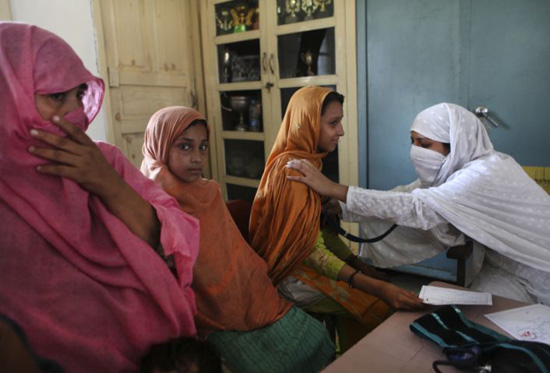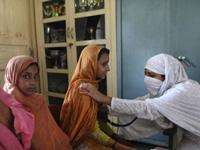After evaluating the needs in and around Peshawar, MSF decided to build a 30-bed reference hospital dedicated solely to women.

Pakistan 2010 © Ton Koene
Women seeking treatment in Khyber Pakhtunkhwa Province following last year's floods in Pakistan.
Pakistan has one of the highest rates of maternal and infant mortality in South Asia. It is a particular problem in embattled Khyber Pakhtunkhwa Province, where access to medical care of any kind is limited and insecurity makes it even harder to reach treatment when needed.
As so often happens, the toll of a situation like this falls heavily on women and children. After evaluating obstetric and gynecological needs in and around Khyber Pakhtunkhwa’s main city, Peshawar, Doctors Without Borders/Médecins Sans Frontières (MSF) decided to build a 30-bed reference hospital that is dedicated solely to women and is furnished with a labor and delivery room and an operating room.
In Khyber Pakhtunkhwa, women who are refugees, displaced, or poor have very little access to high-quality obstetrical and gynecological care. Starting May 18, 70 MSF staff will provide free, emergency OB-GYN care—surgery, labor and delivery, consultations and hospitalization—around the clock.
The goal is to reduce maternal mortality and morbidity by improving the screening, prevention and treatment of disease during pregnancy and/or labor and delivery. Dr. Misa Sugawara, the director of MSF's women's hospital, says that "many lives could be saved if the risks of [labor] complications were detected in time and if emergencies were treated quickly."
MSF will also support health authoritiesin Peshawar district, providing pre- and post-natal care and family planning counseling. This local presence will enable MSF to identify high-risk pregnancies, obstetrical emergencies and women with serious gynecological problems, and to arrange for their transfer to MSF's women's hospital.
To ensure improved access to care, a medical referral network has been set up among the area's health centers, rural communities, and displacement camps. This network will gradually expand to other poor communities around Peshawar and to neighboring tribal areas.
In late 2009, MSF launched a maternal-child health care program at the reference hospital in Dera Murad Jamali district in Balochistan. It also provides maternity and obstetric care in Chaman, on the border with Afghanistan, and in Kulchak, near the city of Quetta.
MSF does not accept institutional funding for its programs in Pakistan and has chosen to rely solely on private contributions. Since 1986, in Pakistan, MSF has provided free medical assistance to Pakistani communities and Afghan refugees who are victims of armed conflict and natural catastrophes and with limited access to care. MSF works in Khyber Pakhtunkhwa province, the Federally Administered Tribal Areas (FATA), and Balochistan.




